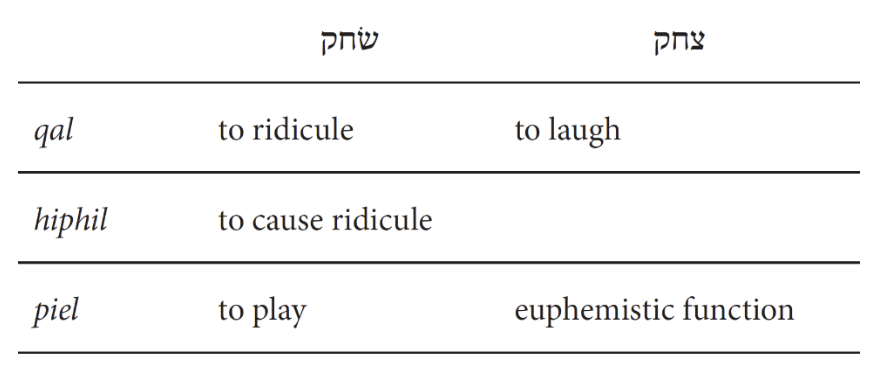I was privileged to contribute a chapter titled “The Lost World of Lexical Semantics: Samson’s Spectacle in Judges 16:25” in For Us, but Not to Us: Essays on Creation, Covenant, and Context in Honor of John H. Walton (eds. A. E. Miglio, C. A. Reeder, J. T. Walton, and K. C. Way, 321-334. Eugene, OR: Pickwick Publications, 2020). The following paragraphs from my chapter are some essential excerpts which demonstrate how to perform word studies on Hebrew verbs and suggest a fresh translation that accounts for figures of speech like euphemism.
Lexical Problem
Judges 16 recounts the story in which the Philistines gather to offer praise and sacrifices to their god Dagon in celebration of the captivity of their enemy, Samson. When the attendants are in high spirits, they shout, “‘Call Samson so that he may entertain us.’ So they called Samson out of the prison, and he acted obscenely before them” (Judg 16:25, author’s translation). The composer uses two different verbs to describe the activities taking place in this verse, though they are often considered simply variant spellings of the same verb. But is his choice of spelling arbitrary, or are there reasons motivating his distinction? These two verbs are related by a sibilant phoneme variation (ṣḥq/śḥq), but their meanings are rarely, if ever, distinguished. In fact, most contemporary English translations assign the same (or similar) meaning to both verbs. But is the difference between them merely orthographic, or is it also semantic? Careful discussion on this question is scant in the literature. For this reason, it is incumbent on interpreters to engage in careful word study. I will demonstrate through synchronic analysis that there is semantic differentiation between these two related roots. I will then explore how a phoneme shift took place (between the consonants ṣadî and śîn [ṣ/ś]) and how certain archaic usages are preserved in the ṣadî-form. Such analysis requires cataloguing all the occurrences of ṣḥq and śḥq and identifying their nuances. Once these nuances are synchronically established, one is better prepared to explain and translate Judges 16:25.
Lexical Base and Synchronic Analysis
Five categories of meaning are established for the sixty-eight occurrences of the roots ṣḥq and śḥq. The resulting nuances, based on synchronic analysis (distinguishing stems and collocations), are summarized in this table.

Reading Judges 16:25
So what aspects of “Samson’s spectacle” (Judg 16:27) are specified in Judges 16:25? When the Philistines shouted, “Call Samson so that he may entertain us” (Judg 16:25a), the word used was śḥq in the piel stem: this is normal Hebrew usage. Then the text says that “they called Samson out of the prison, and he acted obscenely before them” (Judg 16:25b), in which ṣḥq is used in the piel stem. I am suggesting that the only reason archaic ṣḥq would be chosen is for euphemistic purposes. Therefore, the composer intends these two verbs to convey different meanings. Śḥq refers to the Philistines’s cruel intentions (literally, “that he may play for us”), whereas ṣḥq represents Samson’s unexpected actions.
If ṣḥq indeed preserves a euphemistic usage in the piel stem, then Samson does not offer the entertainment that the Philistines are expecting. When the Philistines bring him out for their amusement, Samson perhaps responds with obscene gestures or behavior considered to be in bad taste. Since a euphemism intends to conceal, it is difficult to pinpoint a specific gesture or behavior in the cultural milieu of ancient Philistia/Israel (cf. hand gestures for communicating obscenities in our modern cultural milieu.). However, that the nature of Samson’s response is insulting, offensive, or obscene would be the implication of the term ṣḥq in Judges 16:25b.
 Biola University
Biola University




